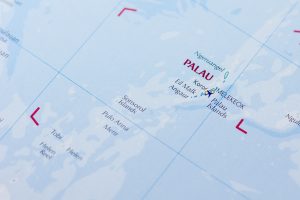As the Biden presidency crosses the symbolic 100-day threshold, China’s predations across the Indo-Pacific are growing almost daily. In the South China Sea, over 200 Chinese fishing vessels refused to leave Philippine waters for weeks in a transparent effort to press Beijing’s sovereignty claims there. Chinese aircraft are regularly setting records for the scale of their encroachment into Taiwanese airspace. A new, Chinese-produced map doubles down on the country’s claim to the Japanese-administered Senkaku Islands. And Beijing’s appetite for economic pressure tactics, extending to goods as diverse as Australian wine and Taiwanese pineapples, shows no sign of abating.
Even the Pacific Islands, many of which have tried to carefully balance a rising China with longstanding partners like the United States, Australia, and New Zealand, are feeling Beijing’s expanding assertiveness. Surangel Whipps, Jr., the president of Palau, has spoken out eloquently on China’s “bullying” behavior against his country of less than 20,000 people, from illegal fishing in Palauan waters to economic retaliation against Palau’s tourism industry for its staunch support of Taiwan.
“This is about securing our borders, and other countries that don’t respect other countries’ borders are not acceptable,” Whipps said after Palauan police, in conjunction with the U.S. Coast Guard, seized a Chinese vessel for illegally harvesting sea cucumber in Palauan waters in December 2020. “Stealing and offering bribes, that’s just got to stop, illegal fishing has to stop. As countries, we should also be responsible to our people and tell them not to go to other countries and do these kinds of things.”
Whipps has emerged as a compelling figure among a new generation of Pacific Islands leaders – a cohort that is skeptical of China’s regional intentions, anxious for stronger ties with traditional security partners, and unafraid to speak out against Beijing’s abuses. While Whipps has been especially outspoken, President David Panuelo of the Federated States of Micronesia (FSM) and President David Kabua of the Marshall Islands are cut from similar cloth.
Yet, as other Pacific Islands leaders calculate their place in the accelerating strategic competition between the U.S. and China, they will be operating from a far different position than the one enjoyed by Whipps, Panuelo, and Kabua. As the leaders of countries with Compacts of Free Association (COFAs) with the United States, they can be confident in Washington’s legal guarantee of their sovereignty and territorial integrity, as well as the many economic and social benefits that accrue from such agreements. In an era of Chinese economic pressure and aggressive influence campaigns, the Freely Associated States (as the COFA signatories are known) have significant protections unavailable to their Pacific Islands peers.
Particularly vulnerable are Nauru, Tuvalu, and Kiribati, whose exceptionally small size and geographic isolation make them especially susceptible to outside coercion. With populations of roughly 10,000, 11,000, and 120,000 respectively, the three rank among the world’s smallest nations. Kiribati’s population is dispersed over almost 1.5 million square miles.
Beijing has already shown its inclination to exert leverage over these tiny islands. In 2019, for instance, China succeeded in prompting Kiribati to switch its diplomatic recognition from Taipei to Beijing in a process that raised concerns about China’s undue interference in Kiribati’s political process. Kiribati, experts worry, could be a portent of things to come. While Nauru and Tuvalu continue to recognize Taiwan, there is no doubt that China is capable of marshaling enormous resources, in the form of both overt economic aid and covert influence, in order to secure its preferred outcomes in small states with relatively opaque governing processes.
As the Biden administration confronts China’s growing assertiveness across the Indo-Pacific, the challenges confronting the smallest Pacific Islands should be front of mind. Not only do these states have some of the region’s most strategic geography, but they are also committed democracies who have long sought to align with U.S. interests in international forums and at the United Nations. Moreover, the response of the U.S. and its partners to Beijing’s aggression among the region’s smallest states will be watched closely across the Indo-Pacific.
To that end, the U.S. should be receptive to an idea long discussed by leading figures in Nauru, Tuvalu, and Kiribati: that of extending versions of the COFA to the smallest states in the region. The idea carries considerable merit. The success of the existing COFAs with the Freely Associated States in providing a bulwark against Chinese aggression offers a model that is appealing to the most vulnerable regional states. In a post-colonial region that prides itself on hard-won sovereignty, the balance the COFAs strike between sovereignty and security has innate appeal.
The Biden administration, for its part, has sought to reaffirm its commitment to a free and open Indo-Pacific during its short time in office. There is no more effective manifestation of that commitment than extending the offer of U.S. assistance to Nauru, Tuvalu, and Kiribati in the form of long-term relationships that protect their sovereignty. With Beijing’s ambitions growing rapidly, it will require a combined effort by Washington and its allies to ensure the Indo-Pacific’s smallest states continue to enjoy independence, security, and prosperity.

































